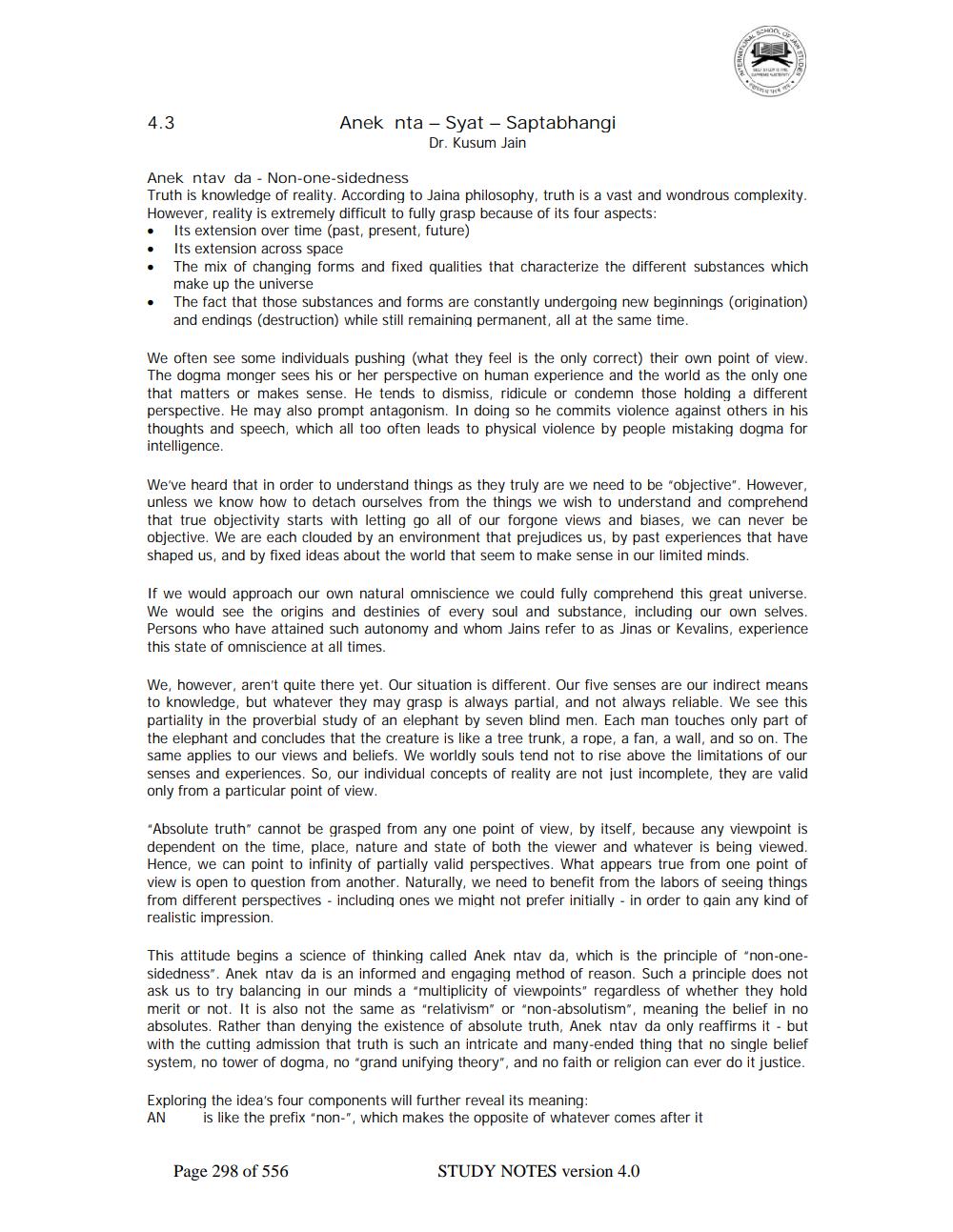________________
4.3
Anek nta Syat - Saptabhangi Dr. Kusum Jain
Anek ntav da - Non-one-sidedness
Truth is knowledge of reality. According to Jaina philosophy, truth is a vast and wondrous complexity. However, reality is extremely difficult to fully grasp because of its four aspects:
⚫ Its extension over time (past, present, future)
Its extension across space
The mix of changing forms and fixed qualities that characterize the different substances which make up the universe
The fact that those substances and forms are constantly undergoing new beginnings (origination) and endings (destruction) while still remaining permanent, all at the same time.
We often see some individuals pushing (what they feel is the only correct) their own point of view. The dogma monger sees his or her perspective on human experience and the world as the only one that matters or makes sense. He tends to dismiss, ridicule or condemn those holding a different perspective. He may also prompt antagonism. In doing so he commits violence against others in his thoughts and speech, which all too often leads to physical violence by people mistaking dogma for intelligence.
We've heard that in order to understand things as they truly are we need to be "objective". However, unless we know how to detach ourselves from the things we wish to understand and comprehend that true objectivity starts with letting go all of our forgone views and biases, we can never be objective. We are each clouded by an environment that prejudices us, by past experiences that have shaped us, and by fixed ideas about the world that seem to make sense in our limited minds.
If we would approach our own natural omniscience we could fully comprehend this great universe. We would see the origins and destinies of every soul and substance, including our own selves. Persons who have attained such autonomy and whom Jains refer to as Jinas or Kevalins, experience this state of omniscience at all times.
We, however, aren't quite there yet. Our situation is different. Our five senses are our indirect means to knowledge, but whatever they may grasp is always partial, and not always reliable. We see this partiality in the proverbial study of an elephant by seven blind men. Each man touches only part of the elephant and concludes that the creature is like a tree trunk, a rope, a fan, a wall, and so on. The same applies to our views and beliefs. We worldly souls tend not to rise above the limitations of our senses and experiences. So, our individual concepts of reality are not just incomplete, they are valid only from a particular point of view.
"Absolute truth" cannot be grasped from any one point of view, by itself, because any viewpoint is dependent on the time, place, nature and state of both the viewer and whatever is being viewed. Hence, we can point to infinity of partially valid perspectives. What appears true from one point of view is open to question from another. Naturally, we need to benefit from the labors of seeing things from different perspectives - including ones we might not prefer initially in order to gain any kind of realistic impression.
This attitude begins a science of thinking called Anek ntav da, which is the principle of "non-onesidedness". Anek ntav da is an informed and engaging method of reason. Such a principle does not ask us to try balancing in our minds a "multiplicity of viewpoints" regardless of whether they hold merit or not. It is also not the same as "relativism" or "non-absolutism", meaning the belief in no absolutes. Rather than denying the existence of absolute truth, Anek ntav da only reaffirms it - but with the cutting admission that truth is such an intricate and many-ended thing that no single belief system, no tower of dogma, no "grand unifying theory", and no faith or religion can ever do it justice.
Exploring the idea's four components will further reveal its meaning: AN
is like the prefix "non-", which makes the opposite of whatever comes after it
Page 298 of 556
STUDY NOTES version 4.0




